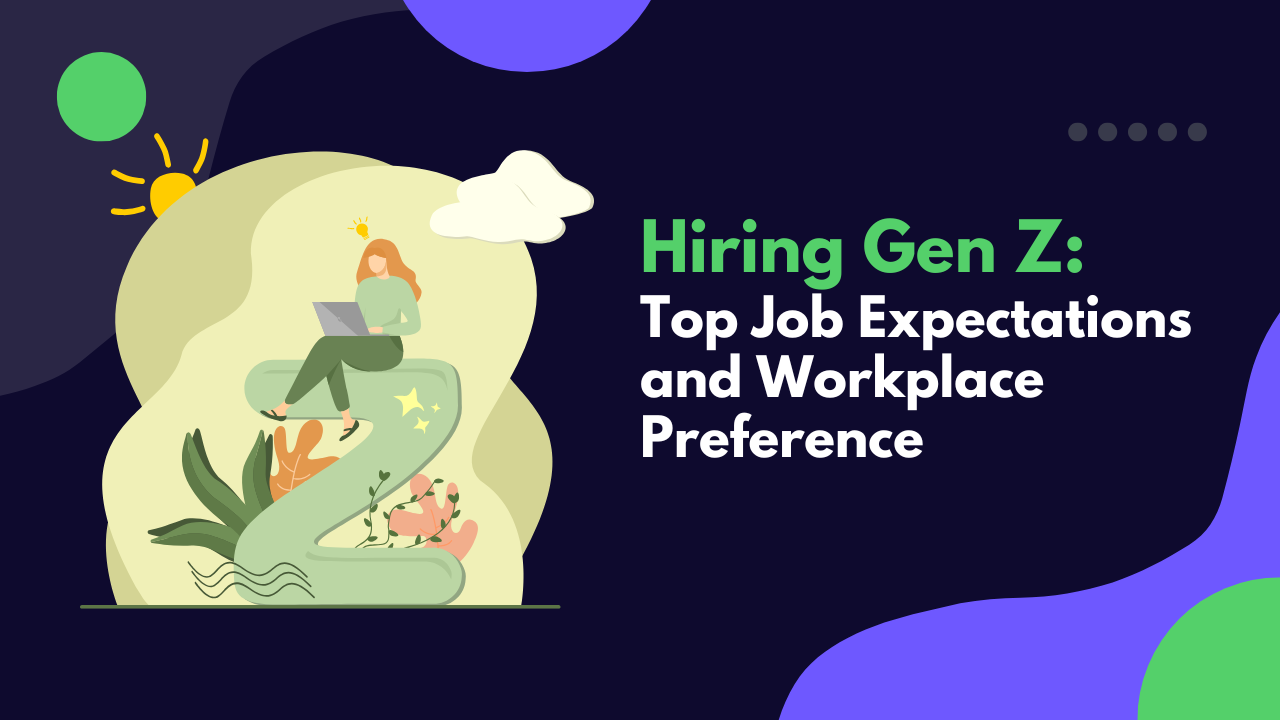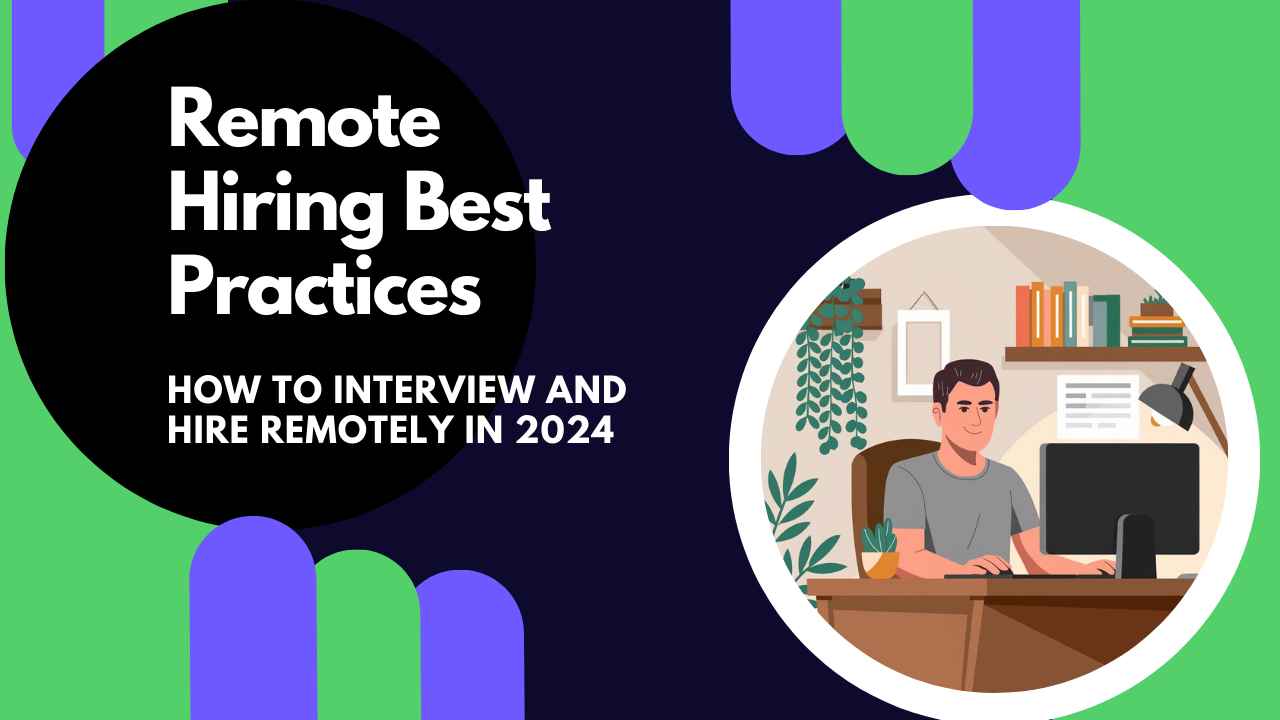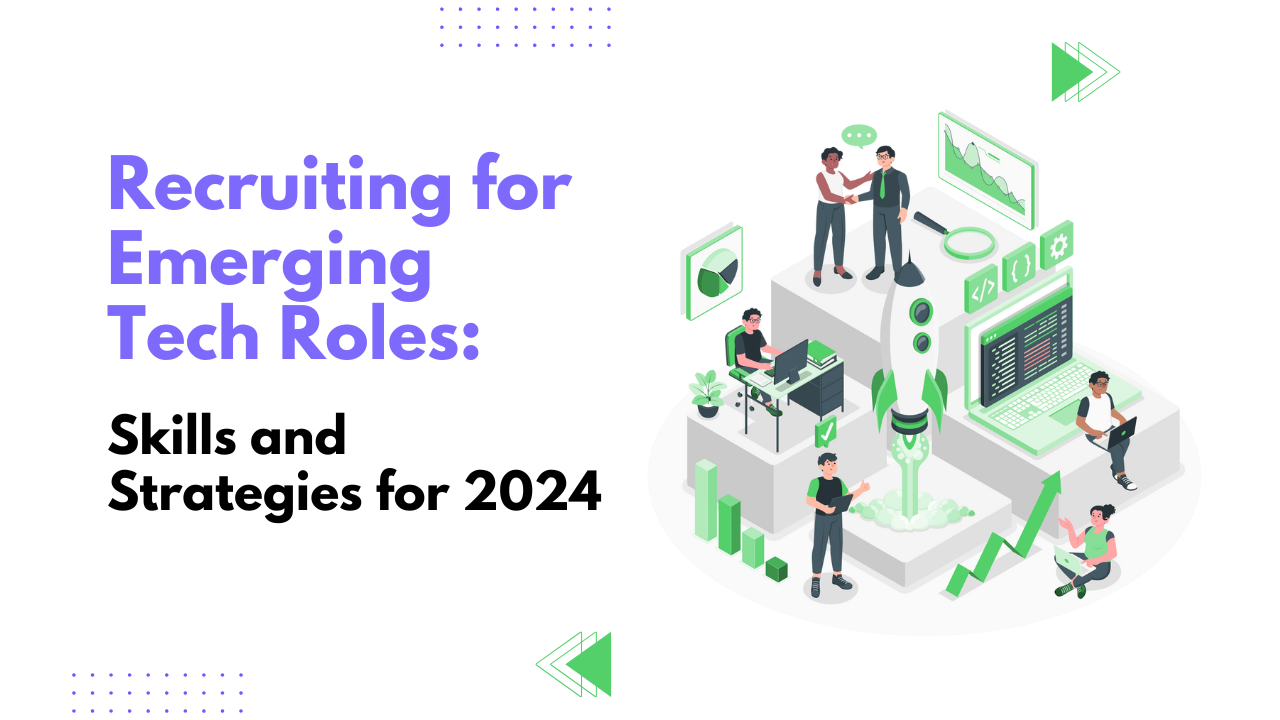As the workforce landscape evolves, one statistic stands out: Gen Z is projected to make up 27% of the workforce by 2025, reshaping workplace dynamics and expectations. This generational shift poses unique challenges—and opportunities—for organizations aiming to attract and retain this new wave of talent. In this blog post, we’ll delve into the critical elements of hiring Gen Z, focusing on their distinctive job expectations and workplace preferences. We’ll explore the essence of what drives Gen Z, from their strong affinity for purpose-driven roles and work-life balance to their demand for innovative technology in the workplace.
Furthermore, we’ll discuss practical strategies for integrating these individuals effectively, like offering transparent communication, competitive compensation packages, and fostering a diverse and inclusive environment. Throughout, we’ll examine how modern solutions, including those offered by taptalent.ai, can enhance recruitment processes. Get ready to transform your hiring approach and tap into Gen Z’s burgeoning potential.
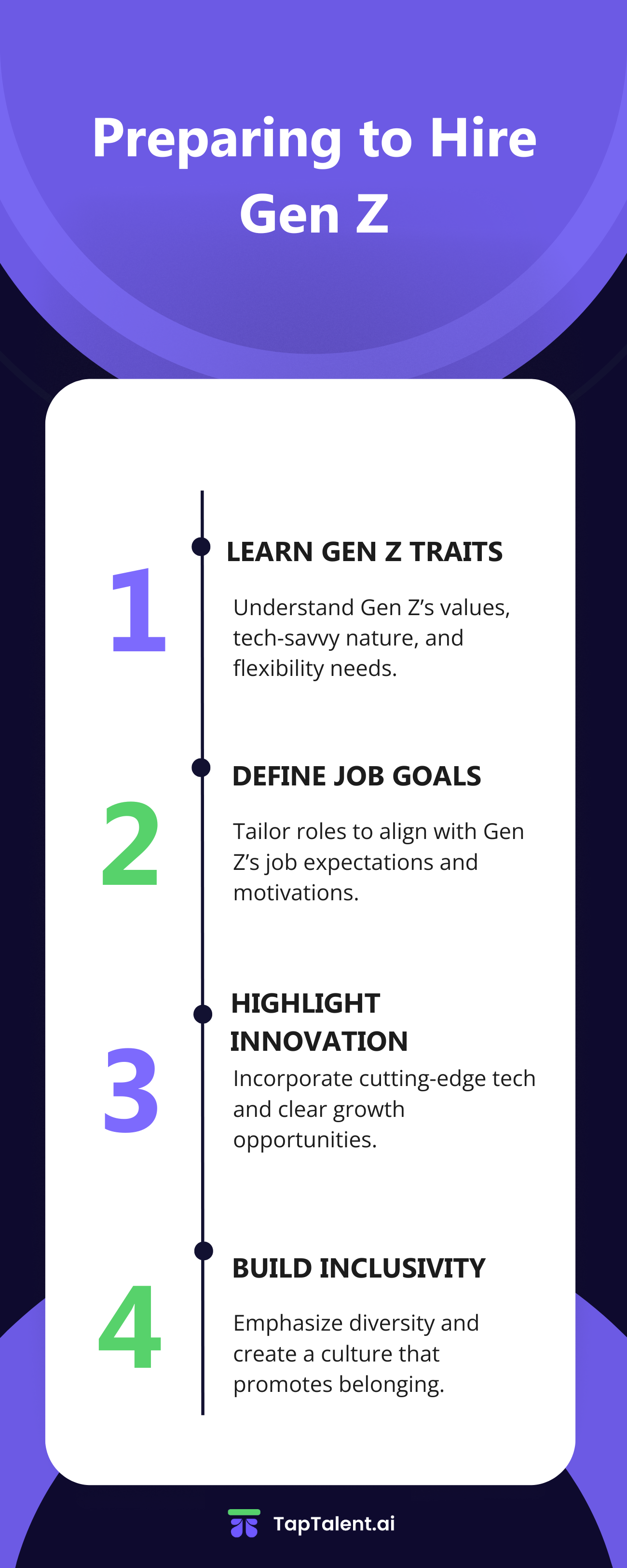
Top Job Expectations When Hiring Gen Z
As we navigate the evolving landscape of workplace dynamics, understanding the top job expectations of Gen Z employees is crucial for effective recruitment and retention. Companies that aim to attract this new generation of talent must prioritize key elements that Gen Z values. First and foremost is transparency and communication. Gen Zers prefer an open dialogue concerning salary, benefits, and career growth. They want clarity and honesty from employers about what is expected, what they can achieve, and how they’re rewarded. For example, Deloitte’s Millennial Survey highlights that over 80% of Gen Z consider transparency vital when evaluating job offers.
Moreover, competitive compensation is a significant driver in their decision-making process. Gen Z focuses on meaningful salary and benefits packages that resonate with their financial priorities. According to a report by PwC, Gen Z ranks financial stability as a top concern, which means that offering substantial compensation can be a decisive factor in recruiting them.
Another quintessential aspect of Gen Z’s expectations is an inclusive work environment. This generation prioritizes diversity and inclusion, demanding workplaces that reflect these values beyond mere tokenism. Companies like Microsoft have successfully attracted Gen Z talent by promoting a culture that emphasizes inclusivity and provides platforms for underrepresented groups to thrive.
Additionally, effective onboarding and training are critical for integrating Gen Z employees. Organizations must establish comprehensive onboarding programs that acclimatize new hires to the company culture, processes, and expectations. This not only helps in aligning the employees’ goals with that of the organization but also fosters a sense of belonging. According to Gallup, 88% of employees believe their onboarding experience can make or break their decision to stay with a company long-term.
To summarize, meeting Gen Z’s expectations requires:
-
- Transparent Communication: Ensure open, ongoing dialogue about job roles, performance, and advancement opportunities.
-
- Competitive Compensation: Provide salaries and benefits that match Gen Z’s financial needs.
-
- Inclusive Work Environment: Cultivate a workplace culture that prioritizes diversity and fosters inclusion at all levels.
-
- Effective Onboarding and Training: Develop thorough onboarding processes to welcome new hires and set clear expectations from the outset.
As companies strive to align their offerings with Gen Z’s priorities, they not only enhance their attraction strategy but also lay the foundation for a mutually beneficial work relationship. Transitioning into our next section, we will explore innovative strategies to refine recruitment processes further, ensuring they resonate with Gen Z’s values and preferences.
Effective Strategies for Hiring Gen Z
To seamlessly attract Generation Z, companies must adopt strategies that resonate with their unique values and expectations. As discussed in the previous section, understanding Gen Z’s job expectations lays the foundation. Now, let’s delve into modern recruitment strategies that will help businesses stand out and connect with this dynamic generation.
Modernizing Recruitment Practices
Gen Z is inherently digital, growing up with the internet and social media. They prefer recruitment processes to be streamlined and tech-savvy. Companies can modernize their recruitment by utilizing platforms where Gen Z frequently engages, such as Instagram and TikTok for job advertisements, showcasing company culture in a relatable and visual manner. For instance, following in the footsteps of companies like Taco Bell, which utilizes Snapchat to connect with younger applicants, could mean expanding a company’s potential recruitment pool.
Crafting Gen Z-Oriented Job Descriptions
A job description is much more than a list of qualifications; it is a reflection of the company’s culture and values. To attract Gen Z, job descriptions should be clear, concise, and value-driven. Employers should focus on highlighting purpose-driven aspects of roles and emphasize the company’s commitment to diversity, work-life balance, and innovation. By doing so, companies demonstrate alignment with Gen Z’s aspiration for meaningful work. A study by Glassdoor reveals that 61% of employees consider company culture essential when applying for a job, further accentuating this necessity.
Leveraging Technology and AI in Hiring
AI and modern technology have transformed the hiring landscape, and their relevance cannot be overstated when targeting Gen Z. Utilizing AI-driven tools, such as applicant tracking systems (ATS), not only optimizes the recruitment process but also personalizes candidate experiences, which Gen Z values. Platforms like taptalent.ai exemplify how technology can streamline recruitment, providing analytics and insights that better match candidates with roles. Such innovations not only improve efficiency but also enhance candidate engagement and satisfaction.
Building a Robust Employer Brand
A strong employer brand is more than just conveying a message; it is about creating an image that Gen Z can connect with. This generation values authenticity and transparency; thus, having a robust brand showcases a company’s commitment to its employees’ well-being and personal growth. Highlight your company’s initiatives, such as diversity programs or sustainability efforts, through social media and on the company website. For example, Patagonia’s emphasis on environmental sustainability resonates well with Gen Z, demonstrating how corporate values can align with personal beliefs, thus attracting talent with shared goals.
To address potential concerns, companies might worry about the costs associated with these strategic modifications. However, the long-term benefits of engaging Gen Z, known for their adaptability and tech savviness, far outweigh the initial investments. Additionally, a question might arise regarding the potential backlash from other generations at the workplace. Companies should ensure that while the recruitment strategy is tailored for Gen Z, the overarching values of inclusion and respect remain constant.
Transitioning to the next section, we will explore the potential challenges businesses might encounter while hiring Gen Z and ways to address these effectively. This includes ensuring generational harmony and meeting the diversified expectations of Gen Z in the workplace.
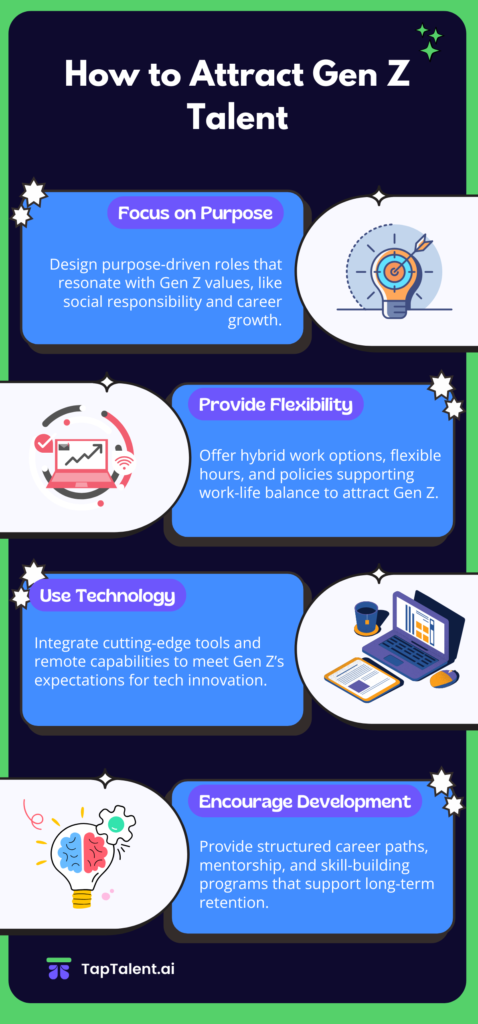
Addressing Potential Challenges in Hiring Gen Z
In navigating the vibrant tapestry of a multigenerational workforce, hiring Generation Z comes with its unique set of challenges. As businesses adopt forward-thinking recruitment strategies, seamlessly integrating Gen Z’s dynamic values into the workplace becomes essential. However, potential obstacles are bound to arise, ranging from generational gaps to managing evolving expectations. Understanding and addressing these challenges head-on can lead to successful retention and engagement of this promising generation.
Bridging Generational Gaps
Generation Z, having grown up in an era abundant with digital advancement and social progressiveness, often sees the world differently than their predecessors. This can lead to friction in the workplace, especially when collaborating with more traditionalist generations. For organizations, recognizing these differences and fostering an inclusive dialogue is crucial. Regular workshops and team-building activities that emphasize empathy and mutual understanding can help bridge generational gaps. Moreover, establishing mentorship programs where Gen Z can learn from experienced colleagues while simultaneously offering fresh perspectives can create a symbiotic relationship that drives innovation.
For example, Cisco’s reverse mentoring program, where Gen Z employees mentor senior staff on technology and digital trends, exemplifies how such initiatives can invoke shared learning while minimizing generational friction.
Managing Expectations and Providing Feedback
Gen Z employees thrive on clarity and frequent feedback. Given their inclination towards immediate and transparent communication, companies must adapt their feedback mechanisms accordingly. Traditional annual reviews may not suffice; instead, consider implementing regular check-ins or weekly performance discussions. This not only helps Gen Z employees stay aligned with company goals but also fosters a culture of continuous improvement and open dialogue.
To illustrate, consider adopting digital feedback platforms like 15Five, which allow for seamless communication and real-time employee insights, catering perfectly to Gen Z’s preference for ongoing, constructive feedback.
Retention Strategies for Gen Z Talent
Retention of Gen Z talent requires a multifaceted approach focused on development and recognition. Providing ample opportunities for professional growth, such as comprehensive training programs, skill workshops, and career advancement paths, can cater to their strong desire for continuous learning. Recognizing and rewarding their contributions through both verbal appreciation and tangible rewards further enhances employee satisfaction and commitment.
Consider Google’s “20% time” policy, encouraging employees to spend 20% of their workweek on projects they are passionate about. This not only addresses Gen Z’s craving for meaningful work but also fosters a culture of creativity and ownership.
Tapping into Gen Z’s Unique Potential
Beyond overcoming challenges, companies can leverage Gen Z’s innate abilities and preferences to their advantage. Their tech-savviness and adaptability make them ideal candidates for roles that require quick learning and innovative solutions. Providing platforms for them to showcase their strengths, such as hackathons or innovation labs, can channel their potential into tangible outcomes.
Practical Tips for a Gen Z-Inclusive Workplace
-
- Adapt Communication Styles: Utilize digital tools and platforms favored by Gen Z to enhance internal communication, keeping it brief and engaging.
-
- Embrace Flexibility: Offer hybrid work models and adaptable schedules to support their work-life balance.
-
- Cultivate a Purpose-Driven Culture: Align company missions with societal impacts that resonate with Gen Z’s values.
-
- Foster Inclusive Dialogue: Implement open forums and collaborative spaces to nurture diversity of thought.
As businesses embrace the challenges and opportunities brought by Gen Z, they prepare for a future where generational harmony and inclusive workplace practices lead to substantial growth and innovation. This understanding helps transition smoothly into the conclusion, where we reflect on and expand upon these impactful insights.
Conclusion: Harnessing Gen Z’s Potential for a Dynamic Workforce
Having delved into the essence of hiring Gen Z, we understand the transformative potential this generation brings to the workplace. From their unique job expectations, such as transparency, competitive compensation, and an inclusive environment, to the challenges and innovative recruitment strategies, companies are equipped to adapt and thrive.
While transitioning from traditional methods might seem daunting, the benefits of aligning with Gen Z’s values far outweigh the obstacles. Forward-thinking organizations are already leveraging their adaptability and tech-savvy nature to drive innovation. Adapting recruitment practices to include platforms like Instagram and TikTok, as well as AI-driven tools such as taptalent.ai, is a step toward meeting this goal.
Emphasizing a purpose-driven culture isn’t just about attracting Gen Z now but about establishing a sustainable growth trajectory. Consider companies like Patagonia, which resonate with this demographic through their commitment to environmental issues, illustrating that shared values can cultivate loyalty.
Practical steps for companies include:
-
- Implementing Modern Recruitment Tools: Utilize technology to streamline processes and offer personalized candidate experiences, ensuring that your tactics are current and effective.
-
- Fostering an Inclusive Work Culture: Maintain ongoing diversity initiatives that go beyond token gestures to truly embrace inclusivity.
-
- Prioritizing Professional Development: Establish mentorship and continuous learning opportunities that align with Gen Z’s desire for growth.
-
- Emphasizing Transparent Communication: Keep channels open for dialogue about roles, expectations, and feedback, thus enhancing engagement and retention.
Looking ahead, companies should prepare for Gen Z’s continued impact on workplace dynamics. This requires a commitment to understanding and integrating their values, leading to a symbiotic relationship where both employer and employee thrive.
Finally, embracing Gen Z isn’t merely about ticking boxes; it’s about evolving to meet the future’s demands. Companies that navigate this landscape with agility and openness will undoubtedly reap the benefits of a dynamic, youthful workforce ready to drive tomorrow’s success.
